Abstract
Aims and Objectives: Although inclusive education of children with intellectual disability is currently an accepted practice, it is often challenged by negative attitude of schoolteachers. We undertook a surveillance study aimed at identifying knowledge and teachers’ attitudes towards children with intellectual disability and practices of inclusive education in a semi-urban school of South India.
Method: Knowledge, Attitude and Practice Surveillance Questionnaires (KAP and ATPD) were done on ninety-six consenting school teachers and analyzed.
Results: The overall attitude mean indicated a favorable attitude towards the children with intellectual disability. The mean overall attitude score was 77.1 (SD: 9.58), with a normal distribution. Forty to fifty percent were aware of intellectual disability and attributed them to biological causes. Ninety two percent agreed the need for education and stepwise training for a child with intellectual disability. In real life practice, results of classroom management were inaccurate.
Conclusion: These findings suggest a general positive attitude towards intellectual disability and inclusive education. However, this study also highlights the need for more comprehensive training programs.
Keywords: Intellectual Disability; Inclusive Education; Attitudes
Introduction
A disability is an umbrella term, covering impairments, activity limitations, and participation restrictions. Thus, disability is a complex phenomenon, reflecting an interaction between features of a person’s body and features of the society in which he or she lives [1]. Children with disabilities are one of the most marginalized and excluded groups in society. Facing daily discrimination in the form of negative attitudes, lack of adequate policies and legislation, they are effectively barred from realizing their rights to healthcare, education, and even survival. Estimates suggest that there are at least 164.5 millions (5.6%) children with disabilities in India, about 660 thousand more than the number recorded in 2001 [2]. These disabilities can occur in various forms such as impairment in seeing, speech, listening, movement or mental functioning. In India, there are several schemes that were designed to address the needs of the disabled but not put into effective action due to various deficits in resources. Children with disabilities are covered under the Persons with Disabilities (Equal Protection of Rights and Full Participation) Act 1995, which mentions setting up of central and state coordination committees, prevention and early detection of disabilities and recognition of institutions for persons with disabilities. Sarva Siksha Abhiyaan emphasizes on free elementary and compulsory education to the children 6-14 years of age. Several programs have been designed to address the educational needs of children with special needs in India. School based programs include, special schools, main streaming, remediation and inclusive education which is further subdivided as partial and full inclusive education. In recent years, there has been a movement from segregated special education settings into general education classrooms in India, particularly in urban settings [3,4].
Despite the government aiding with the education of children with intellectual disability, there are several other challenges in educating these children. Disabilities cause significant learning problems in children and therefore only one percent of children with disabilities have access to school [5]. The negative attitude of teachers towards children with intellectual disability is known to significantly affect learning in children and alters the success and the effectiveness of the intervention [6]. Studies done on knowledge and attitude of practice of inclusive education in India are scarce [7,8]. In this study we examined the knowledge, practice and attitude towards inclusive education among teachers in a suburban school.
Aim: To assess the knowledge, attitude and practices of inclusive education among school teachers in a suburban school in India.
Methodology
Ninety-six consenting teachers of Vedavalli Vidyalaya School, Ranipet willing to participate were recruited. All English speaking school teachers at all levels of teaching willing voluntarily to participate were eligible for the study. The study was done as a retrospective audit and approved by IRB.
Two standard questionnaires (KAP survey and ATPD Scale) were provided. KAP questionnaire had seventeen questions that covered the domains on knowledge, explanatory models, degree of disability, attitudes and real-life practice. Some questions had multiple options were provided that included two types of choices - yes/no/not sure and logical choices. The second questionnaire was the standard ATDP (Attitudes towards disabled persons) questionnaire. The ATDP scale was released by the American Psychological Association in 1960 and widely used since.9 It has twenty standard questions scored on a six-point Likert scale (I disagree very much, disagree pretty much, disagree a little, agree a little, agree pretty much, agree very much). Higher scores have a positive attitude, highest total score being 120 and the lowest total score being 20. The scale has excellent internal consistency, Cronbach’s alpha coefficients of 0. 90, test-retest reliability coefficients median value of 0.73; split half equivalence reliability of 0.73 to 0. 89, median stability equivalence reliability of 0.7 and high construct validity (Figure 1) [9].
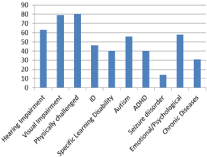
Figure 1: Common disabilities known to the local teachers.
Scoring
Items were scored from 1 to 6; 1- quantifying ‘I disagree very much’ to 6- qualifying ‘I agree very much’. Reverse scoring was applied to items 6 and 12 and calculated accordingly. The data was analyzed by SPSS 16.0 and measures of central tendency were calculated.
Results
Questionnaire 1
Percentages of various disabilities known to local teachers and explanatory models for the same are shown in the diagram (Figure 2). Interesting points to note are that nearly 50% were aware of intellectual disability and attributed them to biological causes. 36 (37.8%) believed that faith healing could make their child all right. Majority 87 (91.5%) agreed to the need for education and step wise training for a child with intellectual disability. In real life practice, more than half (53%) agreed to allow interaction with their own children a quarter (21%) found treatment too expensive and practice of inclusive education was inaccurate (Figures 3,4).
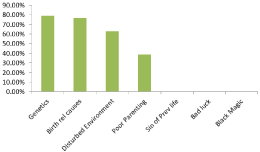
Figure 2: Causes of disability.
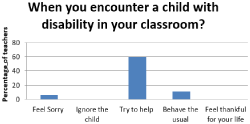
Figure 3: Real life practice.
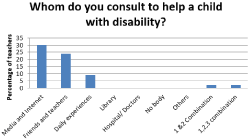
Figure 4:
Questionnaire 2
Results of the attitudes towards the children with intellectual disability are tabulated in Tables 1,2,3. The overall attitude indicated a mildly favorable attitude towards the children with intellectual disability with the mean overall attitude score being 77.1 (SD: 9.58), showing a normal distribution (minimum total score 59; maximum total score 108). Nearly one third of the teachers (31/96) had a negative attitude (Total ATDP score is 120; Lowest ATDP score 20; Mean ATDP score 70. A value above 70 indicates positive attitude). While about 8 % (8/96) of the teachers had a high degree of favorable attitude (with scores above 90).
No
Not sure
Faith healing can make the child alright
36 (37.8%)
23(23.9%)
25(26%)
A child with disability can go to school
87 (91.5%)
0
5(5%)
Appropriate training improves the condition of the child
82 (86.3%)
4 (0.04%)
8(8%)
The person can marry and enjoy his or her life
60 (63.1%)
0
31(32%)
The child can be involved in household activities
76 (80%)
9 (0.09%)
12(12.5%)
The person can look after his/ her property
55(57.8%)
0
29(30.2%)
The child can learn new skills with stepwise training
87 (91.5%)
45(46.8%)
4(4%)
The child should have a disability certificate to prove disability.
25 (26.3%)
45 (46.8%)
21(21%)
Table 1: General Statements on Disability.
S.No
Item
Response Mean*
1
Parents of disabled children are less strict than other parents.
4.9
2
Physically disabled people are just as intelligent as non disabled people.
4.84
3
Disabled people are generally easier to get along with than non disabled people.
3.41
4
Most disabled people feel sorry for themselves.
3.81
5
Disabled people are the same as anyone else.
4.2
6
There shouldn’t be special schools for disabled people.
3.7
7
It would be best for disabled people to live and work in special communities.
3.1
8
It is up to the government to take care of disabled persons.
2.95
9
Most disabled people worry a great deal.
3.94
10
Disabled people should not be expected to meet the same standards as non disabled children.
2.82
11
Disabled people are as happy as non-disabled ones.
3.49
12
Severely disabled people are no harder to get along with than minor disabilities.
3.29
13
It is almost impossible for disabled people to lead a normal life.
2.93
14
You should not expect too much from disabled people.
3.32
15
Disabled people tend to keep to themselves much of the time.
3.85
16
Disabled people are more easily upset than non-disabled people.
4.21
17
Disabled persons cannot have a normal social life.
3.1
18
Most disabled people feel that they are not as good as other people.
3.66
19
You have to be careful of what you say when you are with disabled people.
4.92
20
Disabled people are often grouchy.
3.63
*Response mean is the mean score from the Likert scale of 1 to 6.
Table 2: ATDP Scale (Attitude towards Disabled Persons Scale).
SUBDOMANS
ITEMS
MEAN*
Communication and Interpersonl
1,3,5,12,14,15,17,19
3.87
Work
7
3.1
Self-Care
None
None
Education
2,6,10
3.78
Emotional strength of disabled
4, 9, 11, 13, 16, 18, 20
3.66
Societal
8
2.95
*Mean is the mean score from the Likert scale of 1 to 6.
Table 3: ATDP Subdomains.
The table 2 below highlights the item response mean of the Likert Scale (scored from 1-6). Items with the highest scores were Items 1, 2 and 19. But Item 2 has a negative answer (I disagree very much) as the correct answer and hence can be ignored. Items with the lowest scores were 8, 13 and 10. Mean Scores were similar across the subdomains with slightly higher scores in Interpersonal and Communication, Education and Emotional strengths suggesting a satisfactory understanding in these domains (Table 3).
Discussion
Our findings show a predominantly positive attitude among teachers towards children with intellectual disability with nearly two thirds having an overall ATDP score well above 70. However, several Indian studies have found that a predominant negative outlook prevails among teachers towards the children with intellectual disability especially towards behavioral problems and cognitive deficits like decreased attention [10,11]. Unskilled teachers is another factor that leads to negative attitudes [11]. Other factors of teachers that correlate with negative attitudes included middle aged groups of teachers, male gender, lower education status and lesser income of teachers [10,11]. Indifference in a teacher’s attitude to learning difficulties, personal beliefs and values persists, which greatly hinders teaching skills as well as learning in children with intellectual disability.
Factors that highly correlates with positive attitudes has been found to be a higher acquaintance with the children with intellectual disability [6]. The latter has been found in the Western and Middle Eastern studies and is said to be the most influential factor in determining success of inclusion. However, factors contributing to a positive attitude in our study can be explained by the fact that the territory around Vellore is knowledgeable, with two universities located here and with a school liaison program in our center. Another contributory factor could be that this territory is known to follow high moral standards of living in their day to day life, which is reflective of the positive result (Figures 5,6).
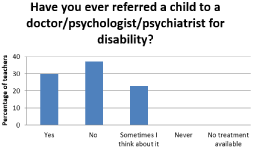
Figure 5:
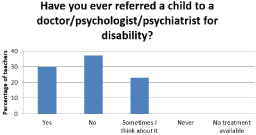
Figure 6:
Even so, our study reveals that classroom management among teachers was poor (KAP questionnaire) and a striking one third of the teachers had a negative attitude with an ATDP score less than 70. These issues can be addressed through frequent school liaisons that include regular reassessment and focused group discussion.
Limitations
Limitations of self-report scales and response bias are applicable and have not been accounted for. Lack of demographic details was a shortcoming for elaborate analysis of data. An interventional study with pretest and posttest comparisons would have increased clarity. Measurement bias with socially desirable responses in an attempt to make good impression should be considered.
Conclusion
As opposed to other inclusive education studies findings from this study demonstrate a positive attitude among school teachers towards children with, with nearly two thirds having a moderately positive outlook. Difference of outcome within the country is a point to note and factors contributing to the same need to be looked into. However, this paper reflects the need for more comprehensive teacher training programs for inclusive education.
Acknowledgement
Funded by FLUID research grant, CMC Vellore.
Special thanks to Dr Sri Sushma, principal, teachers and faculty of Vedavalli Vidyalaya School, Ranipet, India.
References
- Disabilities. World Health Organization. Retrieved 11 August 2012.
- Disabled population. Retrieved from census India.
- Cassady JM. Teachers’ Attitudes toward the Inclusion of Students with Autism and Emotional Behavioral Disorder, Electronic Journal for Inclusive Education. 2011; 2: 2007-2013.
- Bates H, Mc Cafferty A, Quayle E, Mc Kenzie K. Review: typically-developing students’ views and experiences of inclusive education. Disability and Rehabilitation. 2015; 37: 1929-1939.
- India Child Line
- Kala Parasuram. Variables that affect teachers’ attitudes towards disability and inclusive education in Mumbai, India, Disability & Society. 2006; 21: 231- 242.
- Sharma U, Moore D, Sonawane. Attitudes and concerns of pre-service teachers regarding inclusion of students with disabilities into regular schools in Pune, India, Asia-Pacific Journal of Teacher Education. 2009; 37: 319-331.
- Moothedath S, Narasimha MN. Attitude of Primary School Teachers towards Children with Learning Disabilities. Journal of Indian Association for Child & Adolescent Mental Health. 2016; 12: 323-335.
- Yuker HE, Block JR, Young JH. Measurement of attitudes toward disabled persons. Albertson, NY: INA Men Institute at Human Resources Center; 1970.
- Chabra S, Chopra V, Dutta I. Attitude of Prospective Teachers towards Inclusive Education. An International Multidisciplinary Peer Reviewed E Journal. Vol I Issue- I March-April, 2012 Page 1.
- Chimhenga S. Attitudes of teachers towards students with disabilities in mainstream classes: the case of teachers in some selected secondary schools in Zimbabwe. Asian Journal of Educational Research. 2016; 4: 36 to 41.
Citation:Savarimuthu KM, Innamuri R, Tsheringla S, Shonima AV, Mammen MP, Alwinnesh M, et al. Attitude and Practices towards Children with Intellectual Disability and Knowledge on Inclusive Education among School Teachers of Suburban South India-A Retrospective Audit (Paper A). J Psychiatry Mental Disord. 2020; 5(1): 1018.
